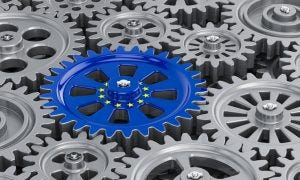
Mustang Bio has established a European manufacturing base for its lentiviral gene therapy candidate MB-107 through a deal with cell and gene therapy CDMO Minaris.
Developed with St. Jude Children’s Research Hospital, MB-107 is Mustang Bio’s lentiviral gene therapy for the treatment of X-linked severe combined immunodeficiency (XSCID), also known as bubble boy disease.
The candidate, which received US FDA Orphan Drug Designation in September, is manufactured from a facility in Worcester, Massachusetts but the firm is now looking outside the US having signed a deal with third-party manufacturer Minaris.

Image: iStock/natatravel
“After reviewing all potential manufacturing scenarios, Mustang Bio decided to transfer manufacturing of its XSCID program to a European-based CDMO to effectively enable access to this therapy for patients in the EU,” Mustang CTO Knut Niss told Bioprocess Insider.
“Minaris has a proven track record of bringing cell and gene therapies to the market in the limited European CDMO space. Most notably, Minaris is the manufacturing base for bluebird bio’s LentiGlobin product, which is approved in the EU.”
Minaris Regenerative Medicine, the contract development and manufacturing organization (CDMO) subsidiary of Showa Denko Materials, has facilities in Ottobrunn, Germany (previously run as apceth Biopharma). The site is undergoing an expansion that will add a 6,650-square-meter facility with additional clean rooms, quality control laboratories, warehousing, cryo-storage and office space.
Until now, the candidate has been made solely inhouse at the Worcester facility. The plant, which opened in 2018, originally intended for chimeric antigen receptor (CAR) T-cell products.
The starting material for MB-107 is hematopoietic stem cells (HSCs), rather than T cells, which are shipped to Worcester where they are genetically modify to create cells that contain normal copies of the gene that is mutated in XSCID, These are then distributed back to trial sites for reinfusion.
But for European supply, it is safer to manufacture in the region, Kniss said.
“One particular challenge for US-based manufacturing is the fact that it poses significant risks for shipment of the starting material. The starting material for MB-107 is bone marrow, which cannot be shipped for extended periods of time.”
However, Mustang is not looking at a regional manufacturing model with multiple sites “as all our programs deliver deep frozen drug products that can be stored for extended periods of time.” Kniss added.
“In the US, Worcester will remain our central manufacturing hub. Minaris will serve as our European hub, as regulatory and logistics require the establishment of a European hub. We have no plans to expand in Europe further at this time.”
About the Author
You May Also Like

schedl_b_and_w.jpg?width=100&auto=webp&quality=80&disable=upscale)
schedl_b_and_w.jpg?width=400&auto=webp&quality=80&disable=upscale)






